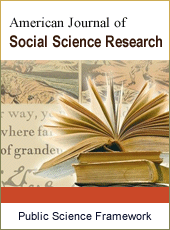American Journal of Social Science Research
Articles Information
American Journal of Social Science Research, Vol.2, No.1, Feb. 2016, Pub. Date: Feb. 17, 2016
Women and Politics in the Middle East: Study on the Broader Socio-Political and Religious Issues
Pages: 17-21 Views: 3352 Downloads: 1777
[01]
Sophia Francesca DP. Lu, Department of Social Sciences, College of Arts and Sciences, University of the Philippines Manila, Manila, Philippines.
Some scholars assert that women’s political participation and religion are not associated with each other, and that formal institutions and structures could either facilitate or hamper women’s political participation. However, other scholars posit that Islam is a major factor in influencing the role of women in Islamic societies. The main hypotheses investigated in this study are: 1) The degree of women’s political participation in the Middle East is comparatively lower than in liberal societies; 2) Islam has not singly molded gender relations and gender ideology in certain Muslim countries, but interacted with other factors such as the state, patriarchy, and international politics; and 3) There is a relation between women’s political participation and the variant of Islamism, either moderate or hardline, and the interpretation of the Quran and Shariah law. Some scholars also espouse that Islam is egalitarian in its original text, and it is Hadith (sayings of Muhammad) and Fiqh (Islamic jurisprudence) that endorse gender segregation and patriarchy. In literature, there are accounts and documents as to the type of women’s political participation, the effect of Islam on their political participation, and the major factors that interact with Islam in affecting women’s political participation. The major sources of data in the study are documents and existing records, and key informant interviews—to bridge the gap in the literature and to substantiate further from the expert’s perspective and knowledge the discourse on the relations between Islam and women’s political participation.
Islam and Women, Middle East, Religion, Women’s Political Participation, Women and Politics
[01]
Blaydes, L. & El Tarouty, S. (2009). Women’s electoral participation in Egypt: The implications of gender for voter recruitment and mobilization. The Middle East Journal, 63(3): 364-380. Retrieved from www.stanford.edu/~blaydes/Voters.pdf
[02]
Cosar, S. Women in Turkish political thought: Between tradition and modernity. Feminist Review, 86: 113-131. Retrieved from http://www.jstor.org/stable/30140853
[03]
Jamal, A. (2009). Gendered Islam and modernity in the nation-space: women’s modernism in the Jamaat-e-Islami of Pakistan. Feminist Review, 91: 9-28. Retrieved from www.jstor.org/stable/40663977
[04]
Kia, M. (2000). Women in Islam and Middle East: A Reader/ Women, Work and Islamism: Ideology and Resistance. Middle Eastern Studies 36(4): 214-216.
[05]
Moghadam, V. M. (1993). Modernizing Women: Gender and Social Change in the Middle East. Colorado: Lynne Rienner Publishers, Inc.
[06]
Monshipouri, M. (2003). Globalization, gender, and religion: The politics of women’s rights in Catholic and Muslim context. Middle East Policy, 10(2): 144-152. Retrieved from http://www.nayerehtohidi.com/wp-content/uploads/docs/tohidi-bookreview-globalization-gender-religion.pdf
[07]
Paxton, P. & Kunovich, S. (2009). Women’s political representation: The importance of ideology. Social Forces, 82(1): 87-113. Retrieved from http://www.jstor.org/stable/3598139
[08]
Prokop, M. (2006). Saudi Arabia: the politics of education. International Affairs (Royal Institute of International Affairs), 79(1): 77-89. Retrieved from http://www.jstor.org/stable/3095542
[09]
Roded, R. (2008). Women in Islam and the Middle East: A reader. New York: I.B. Tauris & Co Ltd.
[10]
Ungor, B. Z. (1968). Women in the Middle East and North Africa and universal suffrage. Annals of the American Academy of Political and Social Science, 375: 72-81. Retrieved from http://www.jstor.org/stable/1037891

ISSN Print: 2381-7712
ISSN Online: 2381-7720
Current Issue:
Vol. 7, Issue 3, September Submit a Manuscript Join Editorial Board Join Reviewer Team
ISSN Online: 2381-7720
Current Issue:
Vol. 7, Issue 3, September Submit a Manuscript Join Editorial Board Join Reviewer Team
| About This Journal |
| All Issues |
| Open Access |
| Indexing |
| Payment Information |
| Author Guidelines |
| Review Process |
| Publication Ethics |
| Editorial Board |
| Peer Reviewers |


